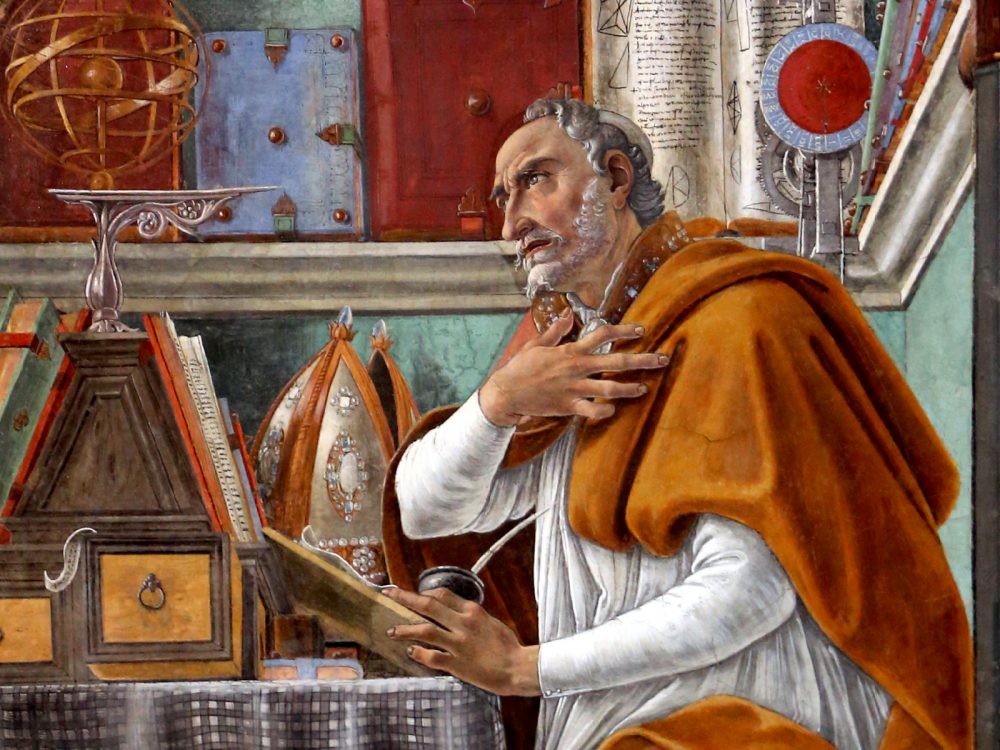Rev. José Mario O. Mandía
We will now study the greatest Father of the Latin Church: Saint Augustine. His influence on Western culture was such that even those who do not know Christianity have heard of him.
Our knowledge of Augustine comes especially from three works: the Confessions, the Retractions (or Retractations), and the Life of Augustine. The first two were penned by Augustine himself, while the third was written by his friend Possidius.
In the Confessions, Augustine tells the story of his return to the Faith. In the Retractationes (Retractions), he reviews his previous works one by one and thushelps us understand the history of his thought. In the Life of Augustine,Possidius describes his work as Bishop of Hippo.
Augustine was born to a respectable family in Tagaste (Roman Province of Numidia) on 13 November 354. His father was a pagan, but through the example and encouragement of Augustine’s mother Monica, he was baptized and died a holy death around 371. Pope Benedict says of Monica: “This passionate woman, venerated as a saint, exercised an enormous influence on her son and raised him in the Christian faith. Augustine had also received the salt, a sign of acceptance in the catechumenate, and was always fascinated by the figure of Jesus Christ; indeed, he said that he had always loved Jesus but had drifted further and further away from ecclesial faith and practice, as also happens to many young people today” (General Audience, 9 January 2008).
Augustine received a good education, mastered grammar and Latin (but not Greek). After reading Hortensius, a work of the Roman statesman and philosopher Cicero (106 – 43 BC), Augustine’s love of wisdom was aroused. This signaled the start of his journey towards conversion. “The book changed my feelings … every vain hope became empty to me, and I longed for the immortality of wisdom with an incredible ardor in my heart” (Confessions III, 4, 7).
There was one problem, however. As mentioned earlier, his mother had engraved in him a love for Jesus Christ. But Cicero, being unfamiliar with the faith, did not talk about the Messiah. Consequently, Augustine turned to Scripture. But he was disappointed with it. “This was not only because the Latin style of the translation of the Sacred Scriptures was inadequate but also because to him their content itself did not seem satisfying. In the scriptural narratives of wars and other human vicissitudes, he discovered neither the loftiness of philosophy nor the splendor of the search for the truth which is part of it” (General Audience, 9 January 2008).
His search led him to the Manicheans who held that good and evil came from two separate sources or principles. Convinced that he had found the right combination of rationality and the search for truth on one hand, and love of Jesus Christ on the other, Augustine became a Manichean.
Pope Benedict says of this period in Augustine’s life: “Manichaeism also offered him a concrete advantage in life: joining the Manicheans facilitated the prospects of a career. By belonging to that religion, which included so many influential figures, he was able to continue his relationship with a woman and to advance in his career. By this woman he had a son, Adeodatus, who was very dear to him and very intelligent, who was later to be present during the preparation for Baptism near Lake Como, taking part in those Dialogues which St Augustine has passed down to us. The boy unfortunately died prematurely” (General Audience, 9 January 2008).
But little by little, Augustine got disillusioned with the Manicheans. His doubts remained and he moved to Italy. In Milan, he listened to the preaching of the bishop, Ambrose, hoping to learn from his eloquence. But he learned more than rhetoric. The contents of Saint Ambrose’s poaching touched his heart.
St Ambrose showed that things, persons and events in the Old Testament pointed to Jesus Christ. This is called the ‘typological interpretation’ of the Old Testament. It was through this approach that Saint Augustine “found the key to understanding the beauty and even the philosophical depth of the Old Testament and grasped the whole unity of the mystery of Christ in history, as well as the synthesis between philosophy, rationality and faith in the Logos, in Christ, the Eternal Word who was made flesh” (General Audience, 9 January 2008).
His rediscovery of Scriptures, especially the Letters of Saint Paul, led to his conversion to Christianity on 15 August 386. He was baptized by Saint Ambrose in the Cathedral of Milan on 24 April 387, during the Easter Vigil. Augustine was 32.
He decided to return to Africa but on the way there, while they were still in Ostial, his mother got very sick and died shortly afterwards. So great was Augustine’s grief.
He settled in Hippo (present-day Annaba, on the coast of Algeria), thinking of founding a monastery. He was ordained priest in 391 and began the monastic life with a few companions. Four years later, in 395, he was appointed bishop. “Augustine continued to deepen his study of Scripture and of the texts of the Christian tradition and was an exemplary Bishop in his tireless pastoral commitment: he preached several times a week to his faithful, supported the poor and orphans, supervised the formation of the clergy and the organization of mens’ and womens’ monasteries” (General Audience, 9 January 2008).
Augustine fell ill and Hippo was besieged by the Vandals in 430 AD. Fortunately, they spared his cathedral and library. His friend Possidius wrote that Augustine asked that the penitential psalms (Psalms 6, 32, 38, 51, 102, 130, and 143) be written in large letters “and that the sheets be attached to the wall, so that while he was bedridden during his illness he could see and read them and he shed constant hot tears” (Life of Augustine 31, 2). He died on 28 August 430.


 Follow
Follow


